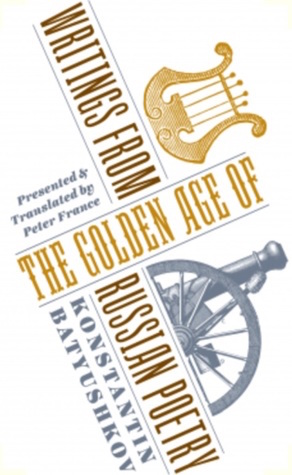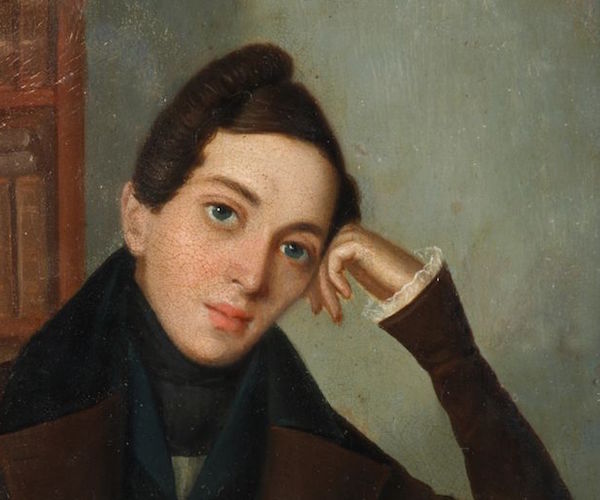Poetry Review: The Golden Age of Russian Poetry — Revisited
Here, then, are two books that provide a fine literary introduction to one of the richest flowerings of poetry in European culture.
Writings From the Golden Age of Russian Poetry by Konstantin Batyushkov. Presented and Translated by Peter France. Columbia University Press, 256 pages, $19.95.
A Science Not For the Earth: Selected Poems & Letters. Translated by Rawley Grau. Ugly Duckling Presse, 640 pages, $25.
By Jim Kates

Translator Peter France prefaces his discussion of Konstantin Batyushkov and his poetry with this statement: “Surprisingly little pre-twentieth century Russian poetry is readily available and well known in the English-speaking world — Pushkin, Lermontov, perhaps Tyutchev, but hardly any other poets.” Yet even more surprising is that so much pre-twentieth century Russian poetry has recently become available. (And a large part of that effort has been propelled by France himself.) One notable source is Michael Ferber’s volume European Romantic Poetry (to which both France and I contributed translations), another is the new Penguin Book of Russian Poetry. Two decades ago, Alan Myers’ An Age Ago: A Selection of Nineteenth-Century Russian Poetry arrived. But all of these are only samplings. France recently edited a handsome selection titled After Lermontov from Carcanet Press. Not long ago James Falen brought out a new, solid Eugene Onegin and Colm Tóibín a Ruslan and Lyudmila. Antony Wood has been releasing his own sensitive Pushkin translations more piecemeal.
Still, when most English-language readers think of nineteenth-century Russian poetry, they can conjure up no more than those two last names, Pushkin and Lermontov. But it is not for only those two names that the first half of that century has come to be called the Golden Age. There were a dozen or more poets of genius and accomplishment writing back and forth to each other and for posterity, a flowering representative of a high Renaissance. Right now, substantial introductions to two of them in English translation land at once on our desk.
One is France’s Writings From the Golden Age of Russian Poetry by Konstantin Batyushkov in the “The Russian Library” series from Columbia University Press. The other is Rawley Grau’s door-stopper edition of Yevgeny Baratynsky, A Science Not for the Earth, published in 2015 by the Ugly Duckling Presse, which is better known for its contemporary list.
Together these two books chronicle the first half of the nineteenth century in Russian poetry, two overlapping generations seen through the lives and work of influential and representative poets of their era. Batyushkov lived from 1787 until 1855, but his effective life as a poet ended in 1821. (His writing career was cut tragically short by madness, followed by silence.) All of his work dates from the first half of his life, when he bridged the poetic sensibility of Western Europe with an emerging aesthetic in Russia. Baratynsky lived a shorter life — from 1800 to 1844 — but his output also exerted a profound cultural influence. One critic, writing in The Handbook of Russian Literature, describes him as “a Hamlet striving for harmony in a world of discord.”

Russian poet Yevgeny Baratynsky — Pushkin once wrote, “Baratynsky is unique among us, for he thinks.”
Writings From the Golden Age of Russian Poetry by Konstantin Batyushkov is far from a straightforward anthology of poems. It is a biographical essay into which are dispersed more than sixty translations, in whole or in part. (The original Russian is not included.) The reader comes to the poetry by way of the prose. The latter ranging from France’s informative narrative to Batyushkov’s own essays and letters. After the 1813 poem “To Dashkov,” France provides a typical annotation:
This poem quickly became regarded as the most significant poetic reaction to the destruction of Moscow in 1812. We don’t know what suggestion from Dashkov prompted such an outburst of feeling, but the grief and patriotic fervor expressed here were real enough. Batyushkov had indeed been three times through the “sacred ashes” of Moscow, and was able to write realistic descriptions. . . .
France’s translations of the poems are looser than the originals, and the reader often has to guess at the “interesting patterns, using lines of varying length and irregular groupings of rhymes, with an alternation of masculine and feminine endings.” Still, France usually comes up with effective English facsimiles.
He graced the world for one brief morning.
He faded like a flower in May
And parted from his friends at life’s first dawning.
And equally often the natural elegance of the original shines through in his English:
And greet my bosom friend again.
It’s a long time since last I sent you
The scratchings of my idle pen.
In 2015, France published Half-Light & Other Poems in the United Kingdom, his well-received volumes of translations of poems by Yevgeny Baratynsky (1800-1844). I’m not sure how available that edition is in the United States. Rawley Grau offers up a generous compilation with A Science Not for the Earth. This book begins with eighty-seven poems (and includes the original Russian texts of these) followed by two hundred pages of the poet’s letters and another two hundred pages of notes. Despite all that hefty literary matter, this not a scholarly edition. It is meant for, and is accessible to, the casual reader of poetry. Baratynsky’s poetic range takes in lyrics as well as thoughtful elegies, among which “The Last Death” has had a lasting influence, and echoes eerily today:
are his? — I proudly wondered. And what was shown me?
The age that now had taken shape I could
but barely grasp with my bewildered mind.
My eyes no longer recognized these people.
Accustomed to a wealth of worldly goods,
they contemplated everything serenely
that in their fathers had caused great unrest …
Grau tries to be particularly sensitive to the implications of Baratynsky’s language:
. . . as I have tried to show, the lack of fire, the muffled music, and the unconcealed struggle we find in Baratynsky’sa lyric work are not failings: they are intrinsic to his understanding of poetry as a search for truth — a science — in an age when prophecy is no longer possible.
This approach leads to some unevenness in the translation, wherein regular verses in the original start out smoothly, but sometimes end a-clunk: “and that one, alas, looks like a veterans’ home.” Grau’s intention is to capture the writer’s sensibility, to accurately catch the tone of the original. Yet this effect is always grounded (perhaps a bit too determinedly) in English verse, in both the serious and the lighter poems.
in the beauty of passions that never fade,
you are not one to mourn the passing
of a sort of youth you once enjoyed.
You are lovelier than our young graces,
your setting sun outshines the day!
More sensuous are you, more fleshly
than are the living, resplendent shade!
Here, then, are two books that make a fine literary introduction to one of the richest flowerings of poetry in European culture. Both in and of themselves, and as windows to their milieux and their contemporaries, Writings From the Golden Age of Russian Poetry by Konstantin Batyushkov and A Science Not for the Earth deserve as much attention from poetry lovers as they can get.
Jim Kates is a poet, feature journalist and reviewer, literary translator and the president and co-director of Zephyr Press, a non-profit press that focuses on contemporary works in translation from Russia, Eastern Europe, and Asia. His latest book is Muddy River (Carcanet), a translation of verse by Russian existentialist Sergey Stratanovsky. His translation of Mikhail Yeryomin: Selected Poems 1957-2009 (White Pine Press) won the second Cliff Becker Prize in Translation.
